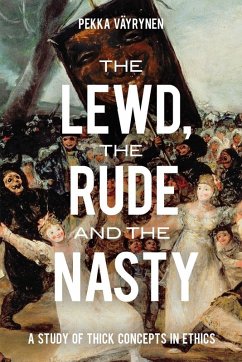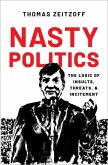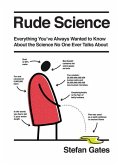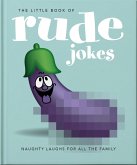Pekka Vayrynen (Professor of Moral P Professor of Moral Philosophy
Lewd, the Rude and the Nasty
A Study of Thick Concepts in Ethics
Pekka Vayrynen (Professor of Moral P Professor of Moral Philosophy
Lewd, the Rude and the Nasty
A Study of Thick Concepts in Ethics
- Broschiertes Buch
- Merkliste
- Auf die Merkliste
- Bewerten Bewerten
- Teilen
- Produkt teilen
- Produkterinnerung
- Produkterinnerung
VÃ yrynen argues that thick concepts -- such as lewd and rude, selfish and cruel, courageous and kind -- are evaluative only as a matter of pragmatics. If thick concepts are not inherently evaluative in meaning, they cannot have the deep and distinctive significance they are often given in moral philosophy.
Andere Kunden interessierten sich auch für
![Nasty Politics Nasty Politics]() Thomas Zeitzoff (Associate Professor, Associate Professor, School oNasty Politics24,99 €
Thomas Zeitzoff (Associate Professor, Associate Professor, School oNasty Politics24,99 €![Something Nasty in the Woodshed Something Nasty in the Woodshed]() Kyril BonfiglioliSomething Nasty in the Woodshed20,99 €
Kyril BonfiglioliSomething Nasty in the Woodshed20,99 €![The Nasty Woman and The Neo Femme Fatale in Contemporary Cinema The Nasty Woman and The Neo Femme Fatale in Contemporary Cinema]() Agnieszka PiotrowskaThe Nasty Woman and The Neo Femme Fatale in Contemporary Cinema24,99 €
Agnieszka PiotrowskaThe Nasty Woman and The Neo Femme Fatale in Contemporary Cinema24,99 €![Rude Science: Everything You Want to Know about the Science No One Ever Talks about Rude Science: Everything You Want to Know about the Science No One Ever Talks about]() Stefan GatesRude Science: Everything You Want to Know about the Science No One Ever Talks about16,99 €
Stefan GatesRude Science: Everything You Want to Know about the Science No One Ever Talks about16,99 €![The Fridge Is Being Rude The Fridge Is Being Rude]() John WoodThe Fridge Is Being Rude9,99 €
John WoodThe Fridge Is Being Rude9,99 €![The Little Book of Rude Jokes The Little Book of Rude Jokes]() OHThe Little Book of Rude Jokes8,49 €
OHThe Little Book of Rude Jokes8,49 €![Captain Underpants and the Big, Bad Battle of the Bionic Booger Boy, Part 1: The Night of the Nasty Nostril Nuggets: Color Edition (Captain Underpants #6): From the Creator of Dog Man Captain Underpants and the Big, Bad Battle of the Bionic Booger Boy, Part 1: The Night of the Nasty Nostril Nuggets: Color Edition (Captain Underpants #6): From the Creator of Dog Man]() Dav PilkeyCaptain Underpants and the Big, Bad Battle of the Bionic Booger Boy, Part 1: The Night of the Nasty Nostril Nuggets: Color Edition (Captain Underpants #6): From the Creator of Dog Man20,99 €
Dav PilkeyCaptain Underpants and the Big, Bad Battle of the Bionic Booger Boy, Part 1: The Night of the Nasty Nostril Nuggets: Color Edition (Captain Underpants #6): From the Creator of Dog Man20,99 €-
-
-
VÃ yrynen argues that thick concepts -- such as lewd and rude, selfish and cruel, courageous and kind -- are evaluative only as a matter of pragmatics. If thick concepts are not inherently evaluative in meaning, they cannot have the deep and distinctive significance they are often given in moral philosophy.
Produktdetails
- Produktdetails
- Oxford Moral Theory
- Verlag: Oxford University Press Inc
- Seitenzahl: 286
- Erscheinungstermin: 1. September 2015
- Englisch
- Abmessung: 234mm x 156mm x 17mm
- Gewicht: 416g
- ISBN-13: 9780190262174
- ISBN-10: 0190262176
- Artikelnr.: 47865463
- Herstellerkennzeichnung
- Libri GmbH
- Europaallee 1
- 36244 Bad Hersfeld
- gpsr@libri.de
- Oxford Moral Theory
- Verlag: Oxford University Press Inc
- Seitenzahl: 286
- Erscheinungstermin: 1. September 2015
- Englisch
- Abmessung: 234mm x 156mm x 17mm
- Gewicht: 416g
- ISBN-13: 9780190262174
- ISBN-10: 0190262176
- Artikelnr.: 47865463
- Herstellerkennzeichnung
- Libri GmbH
- Europaallee 1
- 36244 Bad Hersfeld
- gpsr@libri.de
Pekka Väyrynen is Professor of Moral Philosophy at the University of Leeds
Contents
1 Why Thick Concepts Matter
1.1 A Brief Preview
1.2 The Intuitive Distinction
1.3 Two Questions about the Thick
1.4 Thick Matters
1.5 Looking Ahead
2 Thick Concepts, Meaning and Evaluation
2.1 What is Evaluation?
2.2 What is Meaning?
2.3 What Count as Thick Terms and Concepts?
2.4 Global vs. Embedded Evaluations
3 Against the Semantic View I: The Data
3.1 Methodology: A Quick Overview
3.2 Objectionable Thick Terms and Concepts
3.3 Evaluations and Projection
3.4 Evaluations and Deniability
3.5 Conclusion
4 Against the Semantic View II: Against Rival Explanations
4.1 Three False Starts
4.2 Unwanted Implicatures?
4.3 Empty Thick Concepts?
4.4 Inverted-Commas Uses of Thick Terms?
4.5 Deniability and Metalinguistic Negation
4.6 Conclusion
5 In Defense of the Pragmatic View
5.1 T-Evaluations and Implicature
5.2 T-Evaluations and Conventions of Use
5.3 T-Evaluations and Presupposition
5.4 T-Evaluations and Pragmatic Not-At-Issue Content
5.5 Conclusion
6 Thick Pragmatics
6.1 T-Evaluations and Parochiality
6.2 T-Evaluations and Communicative Interests
6.3 Three Objections
6.4 More on Parochiality
6.5 The Scope of the Pragmatic View
6.6 Conclusion
7 Thick Concepts and Underdetermination
7.1 Disagreement and Extension
7.2 Underdetermination and Evaluation
7.3 Underdetermination and Gradability
7.4 Explaining Underdetermination+
7.5 Conclusion
8 Shapelessness, Disentanglement and Irreducible Thickness
8.1 The Shapelessness Thesis
8.2 Shapelessness and Outrunning
8.3 The Inseparability Thesis
8.4 Irreducibly Thick Evaluation?
8.5 Conclusion
9 Thick Concepts and Variability
9.1 The Variability Argument
9.2 Variability and Comparative Constructions
9.3 Variability in the Positive Form?
9.4 Variability and the Semantic View
9.5 Variability and Specificity
9.6 Conclusion
10 Thick Concepts: Deflating Significance
10.1 Fact-Value Distinctions
10.2 Normative Reasons
10.3 Reflection and Objectivity
10.4 Beyond the Thick/Thin Distinction
10.5 A Final Summary
Appendix: A List of Named Theses
Bibliography
1 Why Thick Concepts Matter
1.1 A Brief Preview
1.2 The Intuitive Distinction
1.3 Two Questions about the Thick
1.4 Thick Matters
1.5 Looking Ahead
2 Thick Concepts, Meaning and Evaluation
2.1 What is Evaluation?
2.2 What is Meaning?
2.3 What Count as Thick Terms and Concepts?
2.4 Global vs. Embedded Evaluations
3 Against the Semantic View I: The Data
3.1 Methodology: A Quick Overview
3.2 Objectionable Thick Terms and Concepts
3.3 Evaluations and Projection
3.4 Evaluations and Deniability
3.5 Conclusion
4 Against the Semantic View II: Against Rival Explanations
4.1 Three False Starts
4.2 Unwanted Implicatures?
4.3 Empty Thick Concepts?
4.4 Inverted-Commas Uses of Thick Terms?
4.5 Deniability and Metalinguistic Negation
4.6 Conclusion
5 In Defense of the Pragmatic View
5.1 T-Evaluations and Implicature
5.2 T-Evaluations and Conventions of Use
5.3 T-Evaluations and Presupposition
5.4 T-Evaluations and Pragmatic Not-At-Issue Content
5.5 Conclusion
6 Thick Pragmatics
6.1 T-Evaluations and Parochiality
6.2 T-Evaluations and Communicative Interests
6.3 Three Objections
6.4 More on Parochiality
6.5 The Scope of the Pragmatic View
6.6 Conclusion
7 Thick Concepts and Underdetermination
7.1 Disagreement and Extension
7.2 Underdetermination and Evaluation
7.3 Underdetermination and Gradability
7.4 Explaining Underdetermination+
7.5 Conclusion
8 Shapelessness, Disentanglement and Irreducible Thickness
8.1 The Shapelessness Thesis
8.2 Shapelessness and Outrunning
8.3 The Inseparability Thesis
8.4 Irreducibly Thick Evaluation?
8.5 Conclusion
9 Thick Concepts and Variability
9.1 The Variability Argument
9.2 Variability and Comparative Constructions
9.3 Variability in the Positive Form?
9.4 Variability and the Semantic View
9.5 Variability and Specificity
9.6 Conclusion
10 Thick Concepts: Deflating Significance
10.1 Fact-Value Distinctions
10.2 Normative Reasons
10.3 Reflection and Objectivity
10.4 Beyond the Thick/Thin Distinction
10.5 A Final Summary
Appendix: A List of Named Theses
Bibliography
Contents
1 Why Thick Concepts Matter
1.1 A Brief Preview
1.2 The Intuitive Distinction
1.3 Two Questions about the Thick
1.4 Thick Matters
1.5 Looking Ahead
2 Thick Concepts, Meaning and Evaluation
2.1 What is Evaluation?
2.2 What is Meaning?
2.3 What Count as Thick Terms and Concepts?
2.4 Global vs. Embedded Evaluations
3 Against the Semantic View I: The Data
3.1 Methodology: A Quick Overview
3.2 Objectionable Thick Terms and Concepts
3.3 Evaluations and Projection
3.4 Evaluations and Deniability
3.5 Conclusion
4 Against the Semantic View II: Against Rival Explanations
4.1 Three False Starts
4.2 Unwanted Implicatures?
4.3 Empty Thick Concepts?
4.4 Inverted-Commas Uses of Thick Terms?
4.5 Deniability and Metalinguistic Negation
4.6 Conclusion
5 In Defense of the Pragmatic View
5.1 T-Evaluations and Implicature
5.2 T-Evaluations and Conventions of Use
5.3 T-Evaluations and Presupposition
5.4 T-Evaluations and Pragmatic Not-At-Issue Content
5.5 Conclusion
6 Thick Pragmatics
6.1 T-Evaluations and Parochiality
6.2 T-Evaluations and Communicative Interests
6.3 Three Objections
6.4 More on Parochiality
6.5 The Scope of the Pragmatic View
6.6 Conclusion
7 Thick Concepts and Underdetermination
7.1 Disagreement and Extension
7.2 Underdetermination and Evaluation
7.3 Underdetermination and Gradability
7.4 Explaining Underdetermination+
7.5 Conclusion
8 Shapelessness, Disentanglement and Irreducible Thickness
8.1 The Shapelessness Thesis
8.2 Shapelessness and Outrunning
8.3 The Inseparability Thesis
8.4 Irreducibly Thick Evaluation?
8.5 Conclusion
9 Thick Concepts and Variability
9.1 The Variability Argument
9.2 Variability and Comparative Constructions
9.3 Variability in the Positive Form?
9.4 Variability and the Semantic View
9.5 Variability and Specificity
9.6 Conclusion
10 Thick Concepts: Deflating Significance
10.1 Fact-Value Distinctions
10.2 Normative Reasons
10.3 Reflection and Objectivity
10.4 Beyond the Thick/Thin Distinction
10.5 A Final Summary
Appendix: A List of Named Theses
Bibliography
1 Why Thick Concepts Matter
1.1 A Brief Preview
1.2 The Intuitive Distinction
1.3 Two Questions about the Thick
1.4 Thick Matters
1.5 Looking Ahead
2 Thick Concepts, Meaning and Evaluation
2.1 What is Evaluation?
2.2 What is Meaning?
2.3 What Count as Thick Terms and Concepts?
2.4 Global vs. Embedded Evaluations
3 Against the Semantic View I: The Data
3.1 Methodology: A Quick Overview
3.2 Objectionable Thick Terms and Concepts
3.3 Evaluations and Projection
3.4 Evaluations and Deniability
3.5 Conclusion
4 Against the Semantic View II: Against Rival Explanations
4.1 Three False Starts
4.2 Unwanted Implicatures?
4.3 Empty Thick Concepts?
4.4 Inverted-Commas Uses of Thick Terms?
4.5 Deniability and Metalinguistic Negation
4.6 Conclusion
5 In Defense of the Pragmatic View
5.1 T-Evaluations and Implicature
5.2 T-Evaluations and Conventions of Use
5.3 T-Evaluations and Presupposition
5.4 T-Evaluations and Pragmatic Not-At-Issue Content
5.5 Conclusion
6 Thick Pragmatics
6.1 T-Evaluations and Parochiality
6.2 T-Evaluations and Communicative Interests
6.3 Three Objections
6.4 More on Parochiality
6.5 The Scope of the Pragmatic View
6.6 Conclusion
7 Thick Concepts and Underdetermination
7.1 Disagreement and Extension
7.2 Underdetermination and Evaluation
7.3 Underdetermination and Gradability
7.4 Explaining Underdetermination+
7.5 Conclusion
8 Shapelessness, Disentanglement and Irreducible Thickness
8.1 The Shapelessness Thesis
8.2 Shapelessness and Outrunning
8.3 The Inseparability Thesis
8.4 Irreducibly Thick Evaluation?
8.5 Conclusion
9 Thick Concepts and Variability
9.1 The Variability Argument
9.2 Variability and Comparative Constructions
9.3 Variability in the Positive Form?
9.4 Variability and the Semantic View
9.5 Variability and Specificity
9.6 Conclusion
10 Thick Concepts: Deflating Significance
10.1 Fact-Value Distinctions
10.2 Normative Reasons
10.3 Reflection and Objectivity
10.4 Beyond the Thick/Thin Distinction
10.5 A Final Summary
Appendix: A List of Named Theses
Bibliography









